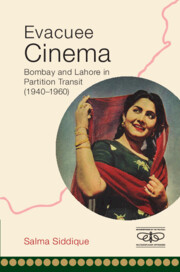Book contents
- Frontmatter
- Dedication
- Contents
- List of Figures
- Acknowledgements
- Introduction: A Moving Picture
- 1 The All-India Ambitions of Lahore
- Part 1 The Secular Stance of Bombay
- Part 2 Between Bombay and Pakistan
- Conclusion: Evacuee Cinema
- Appendix: Three Film Transcripts from the Fazli Family Collection
- Filmography
- Bibliography
- Index
Conclusion: Evacuee Cinema
Published online by Cambridge University Press: 11 October 2022
- Frontmatter
- Dedication
- Contents
- List of Figures
- Acknowledgements
- Introduction: A Moving Picture
- 1 The All-India Ambitions of Lahore
- Part 1 The Secular Stance of Bombay
- Part 2 Between Bombay and Pakistan
- Conclusion: Evacuee Cinema
- Appendix: Three Film Transcripts from the Fazli Family Collection
- Filmography
- Bibliography
- Index
Summary
This study of cinema during British India's partition has actively drawn on existing paradigms of partition and histories of nationalisms in the subcontinent. In doing so it has consciously placed cinema in the field of impending and in-transition nations, even though the sites of production of film cultures are cities and the political context transcends nation states. However, instead of suggesting either the nation state as the exhaustive imaginative horizon of film culture on the one hand or, on the other, the cities’ cinematic absorption in the localised urban, I have emphasised the parallax involved in sighting the national. Through different vantage points of cinema cities lying in different nations now, but also the cinematic lens, the territorial and national ambiguities at the heart of partition become starkly evident. And yet the organising power of this parallactic view cannot be underestimated, as is evident in the enduring ‘secular stance’ of the Bombay film industry, an idea whose hegemony was established in the partition years, that is, 1940–1960. Partition was central to the creation of this stance, achieved through a discursive management and, eventually, the excision of Muslim nationalism, as both a network of film production and a thematic ideology. While this discursive management was coded as belligerence to Pakistan, in both Filmindia and Prithvi Theatre's partition repertoire, the investment in the political also reveals the social processes of film-making in an industrial context polarising along a new national divide. Here, as I have argued in Chapter 2, Muslim nationalism temporarily emerged as a modality of contestation and competition within the Bombay film industry over control of film trade and narratives.
By juxtaposing the incendiary prose of a film magazine and resentful accusations of émigré memoirs, the power of vitriolic enunciations, which create categorical identities amidst turmoil and movement, emerges. These interventions that speak to each other despite being separated in time and space attest to the formation of competing interest groups within the Bombay film industry with critical stakes in the political wrangles of the 1940s. Amidst these feuding articulations, there is Prithvi Theatre with strong links to the Bombay film industry, represented by its star performer Prithviraj Kapoor and fuelled by his film earnings.
- Type
- Chapter
- Information
- Evacuee CinemaBombay and Lahore in Partition Transit, 1940–1960, pp. 220 - 229Publisher: Cambridge University PressPrint publication year: 2023



